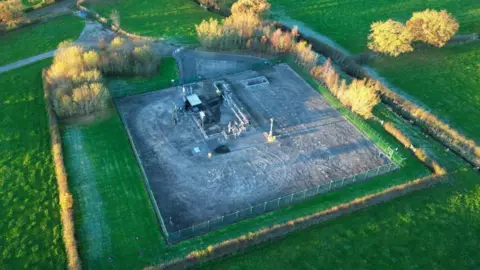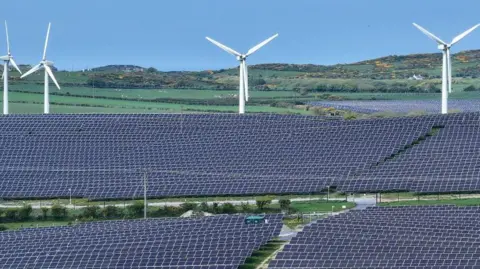Dorset gas storage caverns: What you need to know
 Getty Images
Getty ImagesA company has settled on Dorset for the site of the UK's second series of underground storage caverns for hydrogen gas.
But what does that mean, and why Dorset?
One of three suitable locations
To store gas the way the company, UK Oil and Gas (UKOG), is proposing, you first need to find a thick band of underground salt.
Engineers can drill straight down and inject water to dissolve that salt, creating huge empty caverns.
The brine can then be pumped out and gas can be pumped in to be stored for when it is needed.
Dorset is one of only three areas on the UK mainland that has the geology needed to make this possible, according to the company.
The salt the company is looking at lies about 0.8 miles (1.3km) underneath the surface.
The exact location of the site has not yet been announced, but the company describes it as "west of Weymouth".
What could the impact be?
Storing gas underground is nothing new, and is how most natural gas is safely stored in the UK.
But the use of these caverns for hydrogen has been limited, with only one facility in the UK, located in Teesside in the North East of England.
And a 2022 study from the British Geological Survey said the salt underneath Dorset is less well understood than other parts of the UK and has never been used to store gas.
Local environmental campaigners have voiced concerns that this could lead to problems.
"Hydrogen leaks very easily, and when it leaks, it's dangerous," said Ann Stewart, a Weald Action Group member and coordinator of the Chichester and Arun Green Party.
"Especially if it comes into contact with oxygen, because that's when it's explosive.
"I would like to see really stringent checks over leakage checks, and dealing with leaks very, very quickly."
Ian Williams, professor of environmental science at the University of Southampton, echoed the concerns around explosiveness, while also describing hydrogen as "a powerful indirect greenhouse gas".
He said: "Leakage during production, transportation, and storage can contribute to global warming.
"The lack of information about this new location will not help in terms of limiting anticipated, legitimate public concern."
Plans for gas storage caverns under a lough in Northern Ireland were thrown out last year by the UK Supreme Court, with campaigners arguing the salty discharges from the drilling process could create a marine dead zone.
Ms Stewart said they had similar concerns.
"Where would all that brine go? Because that is a protected coastline," she said.
Stephen Sanderson is CEO of UK Energy Storage Ltd, a subsidiary of UKOG, and said once studies had been completed details of the project would be made available in a public consultation.
"Dorset's Triassic salt deposit is well understood, with around a hundred boreholes and extensive seismic data coverage," he said.
"It is of an equivalent geological age, stratigraphy, composition and thickness to the Triassic salt in the Cheshire Basin, where gas storage caverns have operated safely since 1984."
 Getty Images
Getty ImagesWhy hydrogen?
The UK Climate Change Committee suggests that in the future, hydrogen generated with renewable energy could be stored and used to fill the gaps in the energy supply when wind and solar are not generating enough electricity.
Hydrogen is also considered by the IEA an important potential fuel for the future of some industries that are harder to clean up.
For example, replacing coal in steelmaking furnaces.
However, most hydrogen produced in the UK today is produced from fossil fuels and is not considered low-carbon.
UK Energy Storage Ltd previously said plans for a hydrogen storage facility in Dorset could service the nearby Solent cluster - a regional hub of industry partners, co-founded by Exxon Mobil, who claim they want to make industry in the area greener.
The Solent cluster has plans for a hydrogen production plant at the Fawley refinery near Southampton.
Local politicians, and environmental campaigners like Greenpeace, have accused it in the past of greenwashing - that is, misleading the public about the environmental benefits of the plans.
When will work start on the ground?
UKOG said in a release that it hopes to see construction under way by 2030, with the first caverns being open for business between 2030-32.
But that will be subject to regulatory approval - requiring a Development Consent Order (DCO) from the Secretary of State - and will also depend on what financing is available.
The company intends to bid for government revenue support for the project.
You can follow BBC Dorset on Facebook, X (Twitter), or Instagram.
